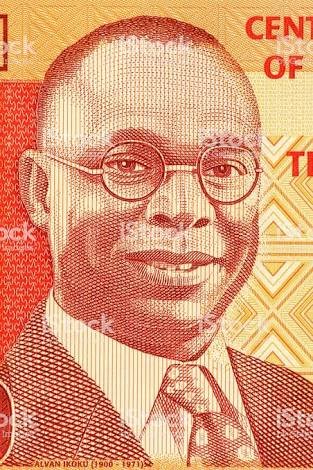Biography
Alvan Ikoku: More than Just a face on 10 naira

By Balogun Kamilu Lekan
On one of those nights, while in camp for my NYSC orientation, a beauty pageant was going on upstage.
My friend and I couldn’t get a seat to occupy since we got to the night show late, so we had to stand at the back of the seated audience to get a glimpse of the razzmatazz.
One of the beauty pageant contestants was asked on what note Tafawa Balewa was.
Legal tenders are daily items we touch and see; the national figures on them shouldn’t be far-fetched from our brains.
The lady committed an incredible gaffe that ruined the night by confidently saying it was the 100 naira note. One who knows the worth of Awolowo’s effort in the history of Nigeria would be angry to the bone marrow.
The crowd was shocked, but the only way to express it was to steam it out with sarcastic hysterics. She got the answer wrong and wasn’t awarded any marks.
What struck me most and later led to a very shocking trauma for me to this day are the three beautiful ladies standing beside us.
Still enjoying the faux pas committed by the contestant up the stage as it wasn’t a member of their platoon. The ladies were still drenched in the laughter from the blunder.
My friend standing beside who was a member of the platoon whose representative committed the blunder, then asked one of the girls who the figure on 100 naira was.
Unhesitatingly, the lady said, “Shey no be Yakubu Gowon?”. Another lady from the circle supported the response with “Na Yakubu Gowon nau”.
A graduate serving her fatherland doesn’t know these facts. It ruined the night for me. Their fault?
Aside from not knowing who these national heroes are by picture alone, millions of Nigerians don’t know what they’ve done or what they truly represent in the history of our country.
I’ve been in a gathering where a secondary school student said, “who be this guy wey dey this 10 naira sef. E no get level”. Apologies to the great Alvan. The young man knows not.
Apart from being just a head appearing on the red note, Alvan Ikoku is a celebrated educationalist and should be idolised and adored for his effort towards free and qualitative primary school education that all Nigerian children enjoy today. It was his effort which kept the legacy to date.
The renowned statesman was awarded the Order of the British Empire (OBE) for his effort. Only a few got this privilege.
Ikoku was born on August 1, 1900, in Amanagwu Arochukwu in Abia State, where he had his elementary education at the Arochukwu Government Primary School before heading to Hope Waddell College, Calabar for his secondary education between 1915 to 1920
The young Alvan got his first teaching job after graduation with the Presbyterian Church of Nigeria and Scotland at Itigidi, Calabar.
Two years later, he rose through the rank to become a senior tutor at St. Paul’s Teachers’ Training College, Akwa, Anambra State.
In 1928, while still teaching in Awka, Ikoku bagged a degree in Philosophy from the University of London via an external program.
The enthusiastic educator established the Aggrey Memorial Secondary School in his hometown, Arochukwu, in 1932. The school was created to promote technical and entrepreneurial education, as well as the teaching of indigenous languages. Alvan was not just the initiator of the project but was also actively involved in its execution by taking up some subjects.
The constitutional change of 1946 paved the way for the inclusion of Nigerians in the legislative chambers, leading to Alvan’s nomination into the Eastern Nigeria House of Assembly.
He contributed immensely towards ensuring the implementation of the decisions of the Nigeria Union of Teachers (NUT) to achieve its aim of promoting education. Ikoku rose to become the president of the Union in 1955.
Still thriving for the implementation of education for all, Ikoku advocated for free primary education across the country. Additionally, he also vehemently advocated for the inclusion of the teaching of indigenous languages in Nigerian schools.
His advocacies were not given serious attention in the first republic, but the Federal Military Government adopted it as a policy in 1976.
With all these efforts, it is unfair to the great soul of Alvan to be relegated to just a red face on the naira note. History that will include a palatial page for heroes like Alvan should be made compulsory in schools to keep them alive even after their death.
The free education policies initiated by Alvan saw the massive enrollment of children in schools.
In recognition of his efforts, Ikoku was awarded an honorary doctorate in law in 1965 at a special convocation of the University of Ibadan.
Also, the Alvan Ikoku Federal College of Education, Owerri, was named after him. Different states across the federation have also named streets and parks after him. One is a major road, Alvan Ikoku Way, in Maitama, Abuja.
The Nigerian government has also named some edifices after this hero in its effort. But teaching them in schools will be the greatest legacy.
Aged 71, Ikoku died on November 18, 1971. See him not as just a man with a face on the red naira note. But a nationalist and one of Nigeria’s greatest educational asset
Disclaimer
The information in this article was curated from online sources. NewsWireNGR or its editorial team cannot independently verify all details.
Follow us on Instagram and Facebook for Live and Entertaining Updates.
Always visit NewsWireNGR for the latest Naija news and updated Naija breaking news.
NewsWireNGRLatest News in Nigeria
Send Us A Press Statement/News Tips on 9ja Happenings: [email protected].
Advertise With Us: [email protected]




